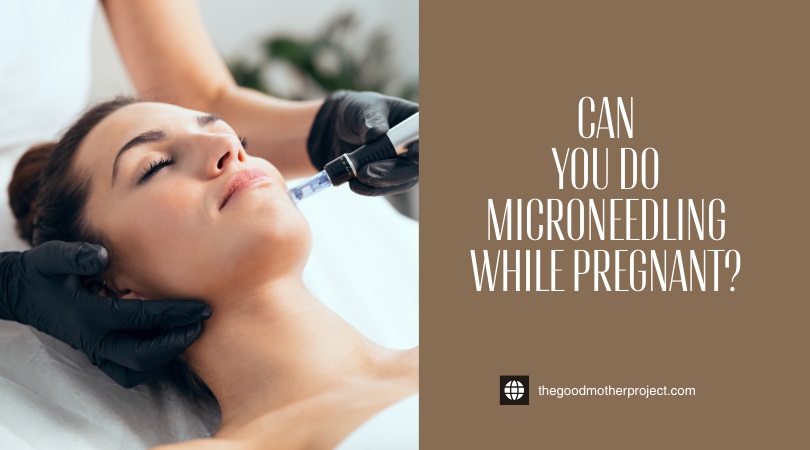Last Updated on January 6, 2025
Microneedling is not recommended during pregnancy. The safety of the procedure has not been established for expectant mothers.
Pregnancy brings unique changes to a woman’s body, including skin alterations. Many women seek safe skincare options during this time. Microneedling, a popular treatment for various skin concerns, involves creating tiny punctures in the skin to stimulate healing. While it offers benefits like improved texture and reduced scars, safety is paramount during pregnancy.
Hormonal fluctuations can make skin more sensitive, raising the risk of adverse reactions. Consulting with a healthcare provider about any skincare procedure is essential. Prioritizing safety ensures both mother and baby remain healthy, making it wise to explore alternative, pregnancy-safe skincare options while expecting.
Microneedling Basics: What You Need To Know
Microneedling is a popular skincare treatment. It uses tiny needles to create micro-injuries in the skin. This process stimulates collagen and elastin production. Many people seek this treatment for various skin issues.
The Science Behind Microneedling
Microneedling works by triggering the body’s natural healing response. Here’s how it happens:
- Needles create controlled injuries in the skin.
- The body responds by producing collagen.
- New skin cells form, improving texture and tone.
This process enhances blood flow and skin renewal. It can help with:
- Fine lines and wrinkles
- Acne scars
- Pore size reduction
Common Uses And Benefits
| Use | Benefit |
|---|---|
| Fine lines | Reduces appearance and smooths skin |
| Scarring | Improves texture and fades scars |
| Pore size | Makes pores appear smaller |
| Skin tone | Enhances overall skin brightness |
Microneedling can be safe for many people. Consult a professional before starting. Pregnant individuals should ask a doctor first.
Pregnancy And Skin Care: Navigating The Changes
Pregnancy brings many changes to your body. Skin changes can be surprising. Hormones fluctuate, and skin may react differently. Understanding these changes is key to effective skin care.
Hormonal Impacts On Skin
Hormones play a significant role during pregnancy. They can lead to various skin issues, including:
- Acne: Increased oil production can cause breakouts.
- Hyperpigmentation: Dark spots may appear, especially on the face.
- Dryness: Skin can become dry and itchy.
- Stretch Marks: Rapid skin stretching can lead to marks.
Each woman’s experience is unique. Some may notice improvements, while others struggle with skin issues. Hormonal changes affect skin texture and tone.
Safe Skin Care Practices During Pregnancy
Choosing the right skin care products is vital during pregnancy. Here are safe practices to follow:
- Consult a Dermatologist: Always seek professional advice.
- Avoid Harsh Ingredients: Stay away from retinoids and salicylic acid.
- Use Gentle Cleansers: Opt for mild, fragrance-free options.
- Hydrate: Keep skin moisturized with safe moisturizers.
- Sun Protection: Use sunscreen with SPF 30 or higher.
Always check labels for safety. Natural products are often the best choice.
| Skin Issue | Recommended Care |
|---|---|
| Acne | Gentle cleansers, hydrating products |
| Hyperpigmentation | Natural brightening agents, sun protection |
| Dryness | Rich moisturizers, hydrating serums |
| Stretch Marks | Moisturizers, oils to enhance elasticity |
Taking care of your skin during pregnancy is essential. A safe and effective routine can make a difference.
Microneedling While Pregnant: Safety Concerns
Microneedling is a popular skincare treatment. Many wonder about its safety during pregnancy. Understanding the risks is essential for expectant mothers.
Potential Risks And Complications
Microneedling involves tiny needles creating micro-injuries on the skin. This process can stimulate collagen production. However, it may pose risks during pregnancy. Here are some potential concerns:
- Infection: Open skin can lead to infections.
- Allergic Reactions: Products used may cause allergies.
- Skin Sensitivity: Hormonal changes can increase skin sensitivity.
- Scarring: Healing may differ during pregnancy.
Pregnancy hormones can affect skin healing. This may lead to unwanted complications. Always consult a healthcare provider before undergoing any treatment.
Expert Recommendations And Alternatives
Many skincare professionals advise against microneedling during pregnancy. They suggest safer alternatives to maintain healthy skin. Here are some expert recommendations:
| Alternative Treatment | Description |
|---|---|
| Facial Cleansing | Gentle cleansing can keep skin fresh and clear. |
| Hydrating Masks | Moisturizing masks help soothe and hydrate skin. |
| Sun Protection | Use SPF to protect skin from UV damage. |
| Gentle Exfoliation | Use mild scrubs to remove dead skin cells. |
Choosing safe skincare options is vital during pregnancy. Always discuss treatments with a healthcare provider. Prioritize the health of both mother and baby.
Frequently Asked Questions
Can Microneedling Harm My Pregnancy?
Microneedling can introduce risks during pregnancy due to skin sensitivity and potential infections.
Is Microneedling Safe During Breastfeeding?
Breastfeeding mothers should consult healthcare providers before microneedling, as skin reactions may affect milk quality.
What Are The Risks Of Microneedling While Pregnant?
Risks include skin irritation, infection, and hormonal changes impacting healing and results.
What Alternatives Exist To Microneedling During Pregnancy?
Gentle facials, hydrating masks, and safe topical treatments are good alternatives for skincare during pregnancy.
How Long Should I Wait After Pregnancy?
Waiting at least six weeks postpartum is advisable before considering microneedling for safe recovery.
Conclusion
Microneedling during pregnancy raises important safety concerns. It’s essential to prioritize both your health and your baby’s well-being. Consulting a healthcare professional before undergoing any cosmetic procedures is crucial. Always choose treatments that are safe and suitable during pregnancy. Your skin will thank you for making informed decisions.








